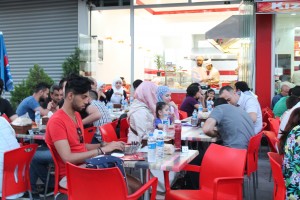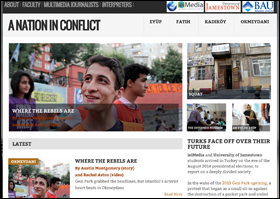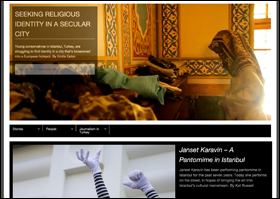Syrian Refugee Lends a Hand After Landing
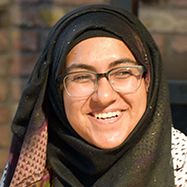
- Amira Zubairi
- On July 28, 2015
Using his business acumen, Syrian exile now helps his compatriots with jobs.
While many Syrian refugees flee to Turkey to escape the distressful outcomes of the Syrian civil war, some, like Mohammed Nizar Bitar, have also found a successful new life here.
Bitar, a 50-year-old Syrian who fled four years ago, is an atypical refugee who brought his entrepreneurial drive to Istanbul. Before his sojourn north, Bitar worked for many years as a mosaic and ceramic designer in Syria. He set up his own business, selling to neighboring countries, including Turkey. When the uprisings started in Syria, he fled to Istanbul to start his life from scratch.
Using his business acumen, Bitar opened a restaurant in the basement of a small house in Aksaray, a neighborhood that’s become a temporary home for Syrian refugees. There, he prepared and sold authentic Syrian meals to the community.
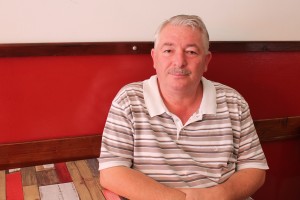
Mohammed Nizar Bitar, owner of Tarbus Restaurant, sits in one of his restaurants just after opening.
Turkey is not a difficult place to run a business, so within a year Bitar moved his restaurant to a larger space in 2012. Today, Bitar owns a chain of restaurants called Tarbus, which invites both Syrians and Turks to experience Syrian cuisine.
The resources Turkey’s 1.7 million Syrian refugees bring with them often dictate their ability to start a new life. Bitar, who during his years as a businessman, established strong networks in Turkey and accumulated some wealth, transitioned to Turkey with relative ease. But for others who have fewer resources and less motivation to start something new, settling in Turkey can be more challenging. Bitar says providing jobs to refugees can help jumpstart their lives.
“The rules are good here and I have succeeded because I had good money, good experience [and] the help of my friends and family,” said Bitar.
Turkey, the world’s largest recipient of Syrian refugees, developed the Temporary Protection (TP) protocol, which gives Syrians the access to protection and assistance in the country. Syrians who have a passport can legally access Turkey without visas and can obtain legal residence permits in most parts of the country.
But despite their qualifications, Syrians have limited employment opportunities in Turkey and often turn to illegal or low-wage jobs. Bitar says the Turkish government can implement rules that enable Syrians to work in more formal sectors, but the Turkish population may see competition rise as a result of the refugees.
“Turkey can make many kinds of jobs for Syrians, even if they are small,” said Bitar. “Syrians have many skills, but they cannot use them here.”
In most countries, starting a business can be a lengthy process, but this is different in Turkey. Foreigners who settle in Turkey usually set up businesses that serve the needs of others, such as hotels and restaurants. According to Bitar, it can take as little as two days to set up a company, provided that all the necessary paperwork is completed.
When he decided to open Tarbus, Bitar needed a valid passport and had to obtain a tax number. After registering his business with the Trade Registry Office, he was ready to begin serving Syrian cuisine to his community.
“I had $1,500 and it was enough to start my restaurant,” said Bitar. “People think Syrians are treated in a special way, but anyone from anywhere can come and open a company in Turkey in a few days.”
Syrians in Aksaray long for a slice of home, and the Arabic signage in the neighborhood promises the much-loved tastes of pre-civil war Damascus.
Syrian food differs slightly from Turkish food, in the amount of oil and spices that is preferred. Bitar wanted to bring authentic Syrian cuisine to the families that were displaced. The majority of his customers are from Syria, but as his unique flavor has gained popularity, Bitar receives customers from Syria, Turkey and other European countries.
“Turkish people prefer Turkish lokanta. It’s in their culture,” said Bitar. “But if they see something special and find good quality products for a good price, they will come and bring their families too.”
The lively restaurant gives Syrians a place to enjoy their nation’s food and to be surrounded with others who are in similar situations as they. Everyday, Tarbus fills up with large families. Waiters wearing black trousers, a white shirt and black tie serve hummus, fried aubergines and flatbread, all foods that are uncommon elsewhere in the city.
“I am so happy to see that Syrians are implementing and accomplishing things here,” said Ahmed Sarraf, who was visiting Istanbul from Qatr. “They are adding something to the country, which gives me hope for our future, and to have Syrian food in Istanbul is really great.”
In his restaurants, Bitar employs young Syrians to help with their transition into the Turkish society. The waiters and cooks, many of whom are former architects, photographers and engineers, speak very little Turkish and English.
For many of the refugees leaving the civil war in their homeland, places like Tarbus provide some employment and normalization, giving them a little bit of stability in an unstable situation.
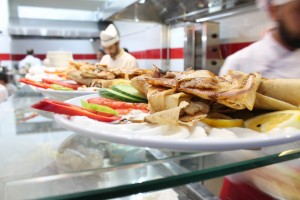
Chicken shawarma platter is set before it’s served. Employees at Tarbus come from Syria with a wide range of professions, from engineering to photography.
“When you work with Syrians, who speak Arabic too, you feel like you are working with your family,” said Mohamed Abbas, a 24-year-old Syrian architect who cooks at Tarbus. “This is better than nothing. I’d rather spend my day doing something rather than hopelessly wasting time.”
Before immigrating to Turkey Bitar made biweekly trips here to sell his factory’s products. He led an affluent lifestyle with his wife and five children.
“But after the war, my family life, my factories and my safety were damaged,” said Bitar in a trembling voice. “Last year, one of my sons was poisoned in Syria, but that’s what God wanted.”
In 2007, Syrian authorities jailed Bitar for 25 days for after he criticized the Syrian government and the country’s way of life, suggesting the country look to Turkey as an example of a democratic system. After his release, Bitar fled to the Ivory Coast for a few years and then found refuge in Turkey.
Bitar inherited his passion for cooking from his parents, who taught him about Syrian, Ottoman and Anatolian cuisine, giving him the chance to turn his hobby into a profession.
Now Bitar thinks often of home, but it’s no more than a passing thought. Turkey is now his home. He appreciates Turkey’s efforts to support Syrian refugees. For him, this is an opportunity to start over. While there may be hardships like the loss of a home or loved ones, Bitar says Syrians must look toward the future and seek success by integrating and finding ways to reach their full potential.
“The hope for me and my people was Turkey,” Bitar said. “I thank the government and the citizens because they respect and care for our [Syrian] people and rights. This is my family now.”
Video
© 2015 ieiMedia / All rights reserved




